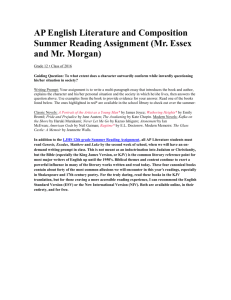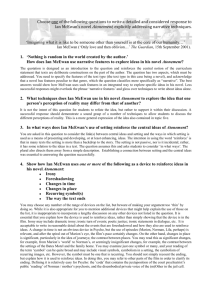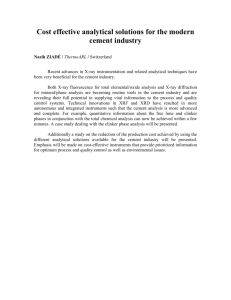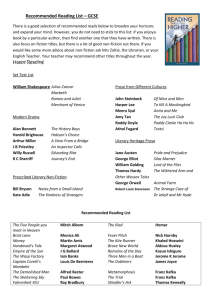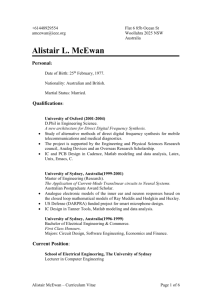Ian McEwan Essay.doc
advertisement
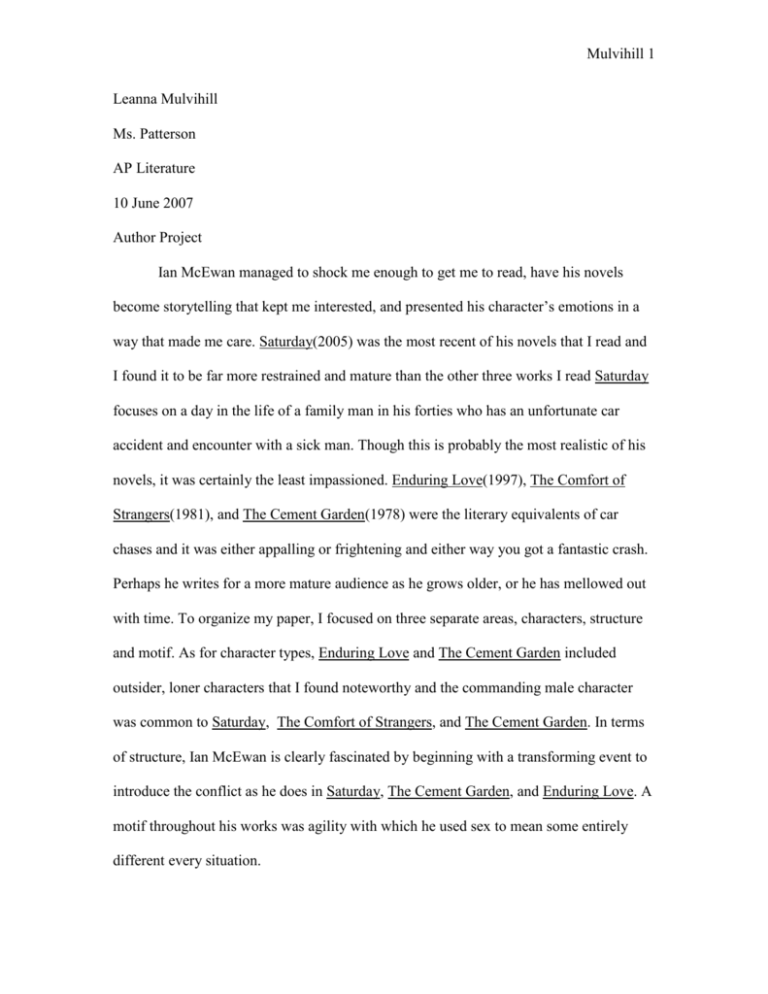
Mulvihill 1 Leanna Mulvihill Ms. Patterson AP Literature 10 June 2007 Author Project Ian McEwan managed to shock me enough to get me to read, have his novels become storytelling that kept me interested, and presented his character’s emotions in a way that made me care. Saturday(2005) was the most recent of his novels that I read and I found it to be far more restrained and mature than the other three works I read Saturday focuses on a day in the life of a family man in his forties who has an unfortunate car accident and encounter with a sick man. Though this is probably the most realistic of his novels, it was certainly the least impassioned. Enduring Love(1997), The Comfort of Strangers(1981), and The Cement Garden(1978) were the literary equivalents of car chases and it was either appalling or frightening and either way you got a fantastic crash. Perhaps he writes for a more mature audience as he grows older, or he has mellowed out with time. To organize my paper, I focused on three separate areas, characters, structure and motif. As for character types, Enduring Love and The Cement Garden included outsider, loner characters that I found noteworthy and the commanding male character was common to Saturday, The Comfort of Strangers, and The Cement Garden. In terms of structure, Ian McEwan is clearly fascinated by beginning with a transforming event to introduce the conflict as he does in Saturday, The Cement Garden, and Enduring Love. A motif throughout his works was agility with which he used sex to mean some entirely different every situation. Mulvihill 2 Ian McEwan certainly includes two character types in his work, the outsider and the dominating male figure. He has said, “Well, these narrators were alienated figures, outsiders, sociopaths. They must all, I have to admit, bear some relationship to myself.” This is mainly because his upbringing never fit in with the rest of British society. His parents were working class, but his father was an officer in the army. He also attended a boarding school in a rural area for talented students from inner-city London. This entire experience left Ian McEwan isolated from both the middle and working classes. Jack, the protagonist from The Cement Garden is a prime example of an isolated character. He begins the novel as friendless except for his close relationship with his sisters and mother. However, once his parents die, he and his sister’s hide their mother’s body and school is out for the summer, he retreats further into himself. Jack stops bathing and becomes distant from his sisters. There had always been sexual undertones to his relationship with his sisters for example when they were younger they and played doctor with Sue as the patient, “We looked into her mouth and between her legs with a torch and found the little flower made of flesh.” (McEwan 16). However his increased isolation from society allows his thoughts to deviate from the norms and the seeds of sexual thoughts about his sisters manifest into a burning desire to be his older sister Julie’s and he does. In Enduring Love Jed Parry had always been a loner and a zealous Christian, but once he inherited money and a house from his aunt he had the freedom to quit his job and completely envelope himself in his religious beliefs away from the influence of society. When he meets the protagonist, Joe, he takes their interaction to be an invitation to a romantic relationship and falls in love with him. He believes it to be his duty to save his soul through Christianity and his love is intertwined with the love of Jesus Christ. Parry Mulvihill 3 calls Joe repeatedly, waits outside his house everyday and even attempts to murder Joe after he is rejected. The theme with these characters is that isolation allows them to rationalize reaching out to people inappropriately. The recurrent dominating male figure in Ian McEwan’s work is based on his own father whom he describes as “He was once a powerful, domineering, slightly bullying man who was extremely loving towards me, passionate about me in ways that were both supportive and oppressive.” The father in The Cement Garden definitely has elements of Ian McEwan’s own father in the way treated his youngest son, Tom, “always going at him in a needling sort of way.” and need to point out flaws in his family members. It was the death of the father that set the plot of The Cement Garden into action. The Comfort of Strangers has Robert, an extreme example of an antagonistic, controlling character. He rapes and beats his wife because he hates her until she is crippled and she loves to submit to him. She follows his plan to rape and kill Colin while his drugged wife Mary is held captive to watch. A subdued loving version of this father-figure is present in Saturday as a man who does not understand his son’s career as blues musician, but reluctantly approves because “Theo Perowne plays like an angel.”(McEwan 26). Structurally, many of his novels are similar in that the plot is set off by a colossal event that dramatically changes the lives of his characters. He clearly developed this technique as he continued his career because the beginnings of his earlier novels are less definitive than his later ones. The Cement Garden begins with the father dying of a heart attack that sends the mother into a downward spiral of depression contributing to her death shortly after his. This leaves the Jack and his siblings on their own and allows them to withdraw from society. Tom decides he would much rather be a girl and Jack and Julie Mulvihill 4 develop an incestuous relationship. Though the father’s death is a major factor in the novel it is not as completely transforming as events in other novels because the potential for the resulting events was always there; no new characters were introduced. The Comfort of Strangers is completely devoid of a transfiguring event at the beginning as Mary and Colin slowly realize Robert and Caroline are an imminent threat. However, his later novels, Enduring Love and Saturday are centered on these events and dealing with their respective aftermaths. Enduring Love kicks off with a hot air balloon accident. Seven or eight men, including Joe Rose and Jed Parry, rush to the center of a field where the hot air balloon was descending with John Logan dangling from it and his grandson in the basket. The group hangs on to keep the balloon to the ground, but one unknown member of the group drops in an act of self preservation. This of course sends the balloon higher and the possibility of grounding the balloon is gone and one by one the men drop safely to the ground except for John Logan who hangs on too long and is killed by the fall. Jed takes the glances exchanged between them and their conversation after the accident as a discreet proclamation of love and an invitation for a romantic relationship and begins his one-way courtship. He calls Joe repeatedly, follows him, attempts to kill him and ruins his marriage over the next several weeks. The accident is a catastrophic introduction to the main conflict of the novel and the character that perpetuates it in one package. Saturday is not nearly as plot driven as his other novels as it is about showing how one event can have repercussions on other aspects of a person’s life within the span of a day. Henry Perowne, the main character, gets into a car accident in the morning with a man named Baxter that is intent on beating him up to preserve his own honor and extorting the money necessary for the repairs from him. When Perowne takes control of the situation Mulvihill 5 by telling Baxter he is a doctor, knows he has Huntington’s disease and can help him get treatment he humiliates Baxter by revealing this weakness in front of his cronies. Later that day, Baxter goes to Perowne’s house to avenge the morning’s disgrace. He orders Daisy, Perowne’s daughter to strip down so he may rape her, however this exposes Daisy’s pregnancy and he has her recite a poem instead. Months later Perowne operates on him knowing Baxter will simply slip further into the agonies of the disease. While the accident itself is not a life changing event for Henry Perowne, it does change the course of his Saturday. The alarming events at the beginnings of his novels and even those included later on in their respective works, like the attempted murder of Joe Rose, the rape and murder of Colin, and the manifestation of Jack and Julie’s inappropriate sexual relationship elicit a visceral response. Ian McEwan has said “I was often accused, later, when these stories were published in volume form, of writing to shock, and although I’ve always denied it, it is the case that I did want them to be vivid.” The genuine intensity of his fiction is ultimately what makes it so compelling because he is certain to evoke sympathy. As he has said “Fiction is a deeply moral form that is the perfect medium for entering the mind of another.” Ian McEwan has a motif of sex throughout his body of work and each time it has a new implication. In The Cement Garden, Jack and Julie have incestuous sex that symbolizes the transition that they and their siblings Tom and Sue are making. After their mother died the siblings encased their mother’s body in cement and hide her death from the authorities to avoid foster care and they spend a summer virtually isolated from society. Derek, Julie’s boyfriend, had suspected the sibling’s secret and when he walks in on Jack “as [he] closed [his] lips around Julie’s nipple” (McEwan 149). This enrages him Mulvihill 6 and he smashes open their mother’s cement casket and police sirens are heard in the background. The incest and their mother’s body have been revealed to Derek, the embodiment of society, and now the remains of this family will have to confront the society they so desperately escaped from. In The Comfort of Strangers Colin and Mary have sex because they are falling in love with each other a second time. Sex is a means of physical intimacy accompanied by emotionally revealing conversations. Within the same work, Robert uses sex for power. He rapes and beats his wife until she is his crippled captive. Caroline submits with a smile and becomes his obedient accomplice when they rape and kill Colin. Joe and Clarissa in Enduring Love are in love at the beginning of the text and use sex to reassure themselves of their relationship after the crisis of the hot air balloon crash. Jed Parry is in love with Joe Rose, but he does not want a sexual relationship with him. He wants to save Joe through the love of Jesus. For Henry Perowne of Saturday, sex means sex with his wife Rosalind “These eyes, these breasts, this tongue, this welcome.” (McEwan 40). He has loved her for almost twenty-five years and is perfectly content with their life together. In Ian McEwan’s hands sex is an amorphous thing he deftly shapes for the situation at hand. Ian McEwan makes the loner, the dominating father-figure, the life-altering event, and sex work for him and he does it well. This project was a great experience for me because I have always wanted to read multiple books by one author to learn about writing, but I never had the patience to do it until I was forced to. The well choreographed nature of the description of the attempted murder in Enduring Love was haunting, and the way Henry loved Rosalind in Saturday was sweet in its simplicity. The Cement Garden’s climatic scene where Derek walks in on Julie cheating on him with her brother was funny Mulvihill 7 because it was so underplayed, just “ ‘Now I’ve seen it all.’ ” (McEwan 149) The Comfort of Strangers got under my skin and scared me. Ian McEwan made it memorable.

